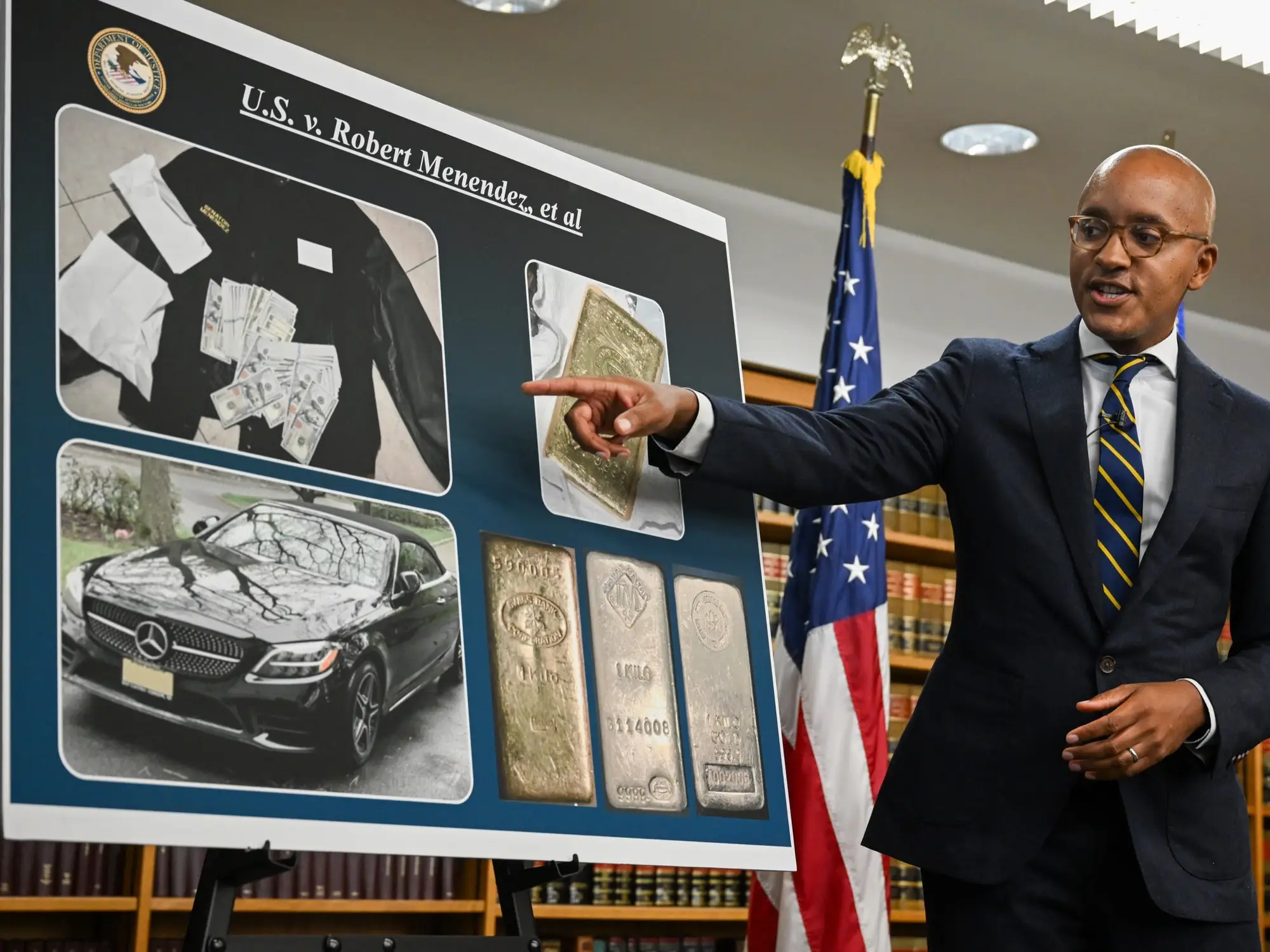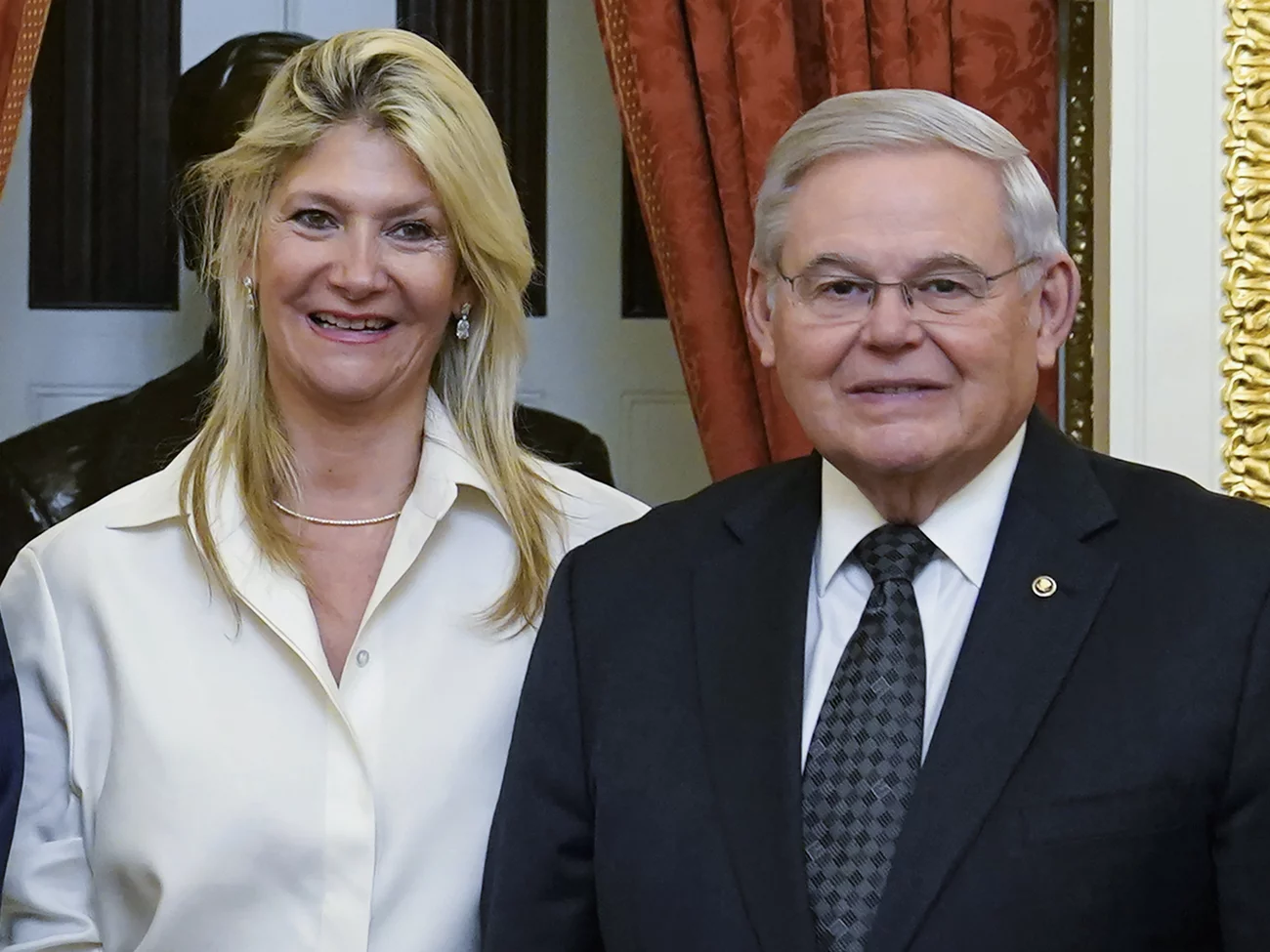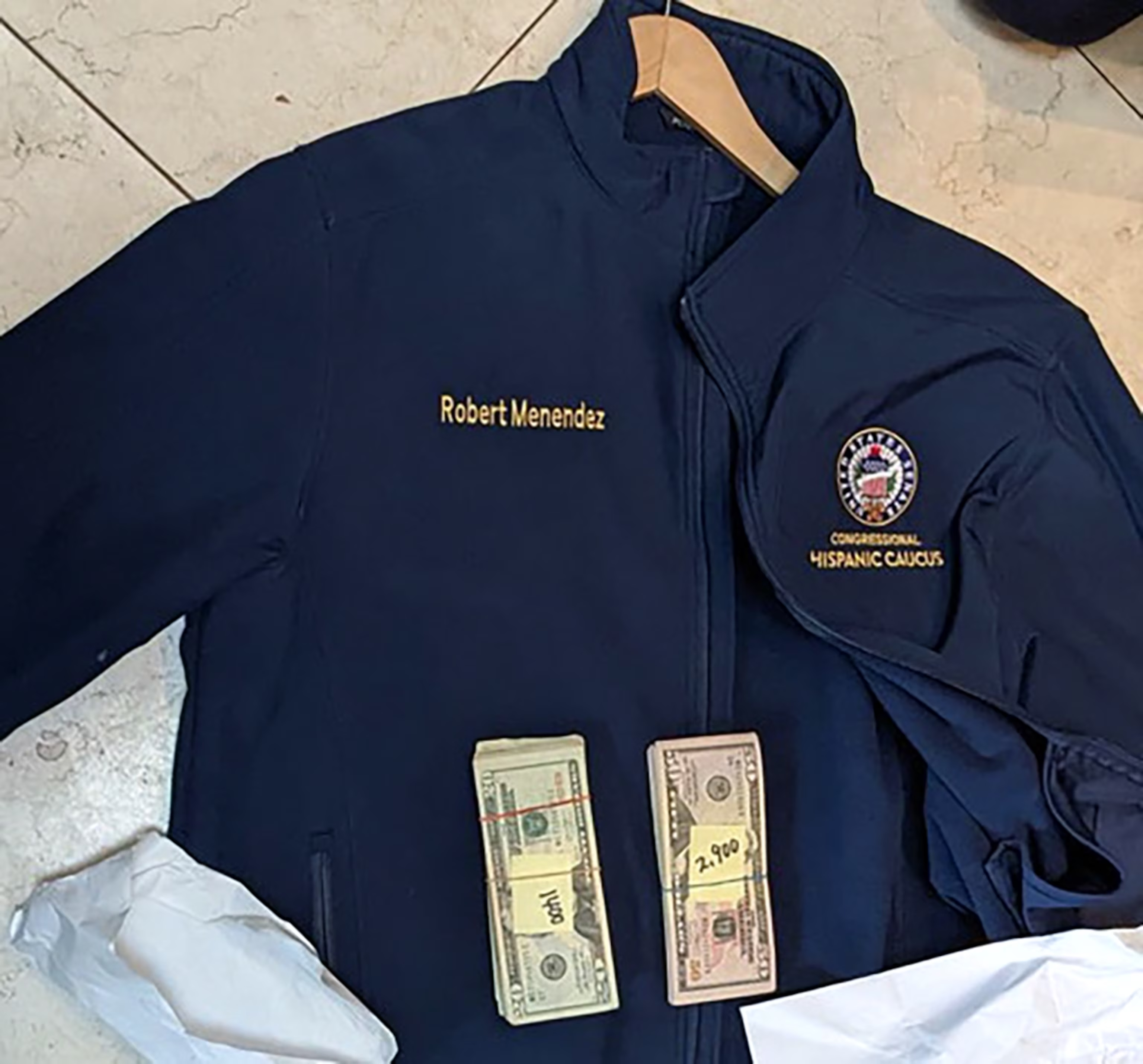To prosecutors, he’s a criminal, a clever politician who stashed gold bars and hundreds of thousands of dollars in bribes in his closet.
But to supporters, Sen. Bob Menendez is a patriot, a hero who can do no wrong.
Menendez “is the most important figure in the history of the Cuban exile in Washington,” television executive Carlos Vasallo gushed after interviewing the New Jersey Democrat in December.
The senator’s crowning achievement, his supporters say, has been his ability to keep in force the Cuban embargo, aimed at crushing the socialist government’s economy. And the Biden administration makes clear that when it comes to Cuba, Menendez is a key gatekeeper.
Menendez reminded people of his power to sway Cuba policy during the interview with Vasallo, president and CEO América CV, a Spanish-language television network. He said if not for himself and other Cuban-American lawmakers, including Mario Díaz Balart, U.S. “policy towards Cuba would have been very different.”
Critics say it’s wrong for one man to have a stranglehold on Cuba policy.
“It’s supposedly a democratic system, but yet you have Bob Menendez who has this disproportionate impact on the policy,” Erik Sperling, a foe of the Cuba embargo, said in a new film, Uphill on the Hill, by the media outlet Belly of the Beast.
Sperling, executive director of the DC-based advocacy group Just Foreign Policy, is especially critical of the State Department’s decision, at the senator’s urging, to designate Cuba a state sponsor of terrorism on Jan. 12, 2021.
The Biden administration has struggled to provide any evidence for the claim.
The terrorism designation severely limits Cuba’s ability to carry out international financial transactions and has been devastating to its already battered and dysfunctional economy.

Liz Oliva Fernández, a journalist with Belly of the Beast, investigated the terrorism designation in Uphill on the Hill. At a State Department press briefing, she asked for evidence that Cuba sponsored terrorism.
Principal Deputy Spokesperson Vedant Patel replied:
“Well, the regime has a long track record of egregious human rights abuses, suppression of a free press, suppression of civil society and other key factors that continue to keep them on that list.”
“But can you give examples?” Fernández asked.
Patel evaded the question and called on another reporter.
Later in the documentary, U.S. Rep. Jim McGovern, D-Mass., told Fernández that U.S. policy toward Cuba is “an embarrassment and a miserable failure.”
Putting Cuba on the list of state sponsors of terrorism “is literally strangling the island,” McGovern told her, “and is tantamount to a human rights violation. Cuba’s on there for political reasons.”
The only other countries on the State Department’s blacklist are North Korea, Iran and Syria.
“The State Department’s list of state sponsors of terrorism cannot be taken seriously. The latest annual report on terrorism offers no evidence whatsoever that Cuba is sponsoring terrorism,” said William LeoGrande, a leading expert on Cuba.
“Trump put Cuba on the list just weeks before leaving office in order to complicate U.S.-Cuban relations for Biden, and Biden has not had the political courage to take it off. The hypocrisy of this list goes well beyond Sen. Menendez; the U.S. government has harbored many Cuban exiles guilty of terrorist attacks on Cuba, including Orlando Bosch and Luis Posada Carriles, guilty bombing a Cuban airline flight killing all 73 people aboard, and bombing tourist hotels in Havana. And most of those terrorists were originally trained by the CIA to wage paramilitary war against Cuba, which was a form of state sponsored terrorism.”
When it comes to Cuba, many in the U.S. believe “anything goes,” former Cuban diplomat Carlos Alzugaray said.
“There is a tendency to consider that terrorist acts are a legitimate form of struggle,” he said. “A rational attitude toward Cuba should prioritize national interests and not a desire of revenge, which leads U.S. policy to repeat again and again the mantra of coercive actions to provoke a regime change.”
Menendez is unapologetic.
“We are in this fight standing tall and we are not going to let go until we achieve the freedom of the Cuban people,” he said in the interview with Vasallo.
Joe Garcia, a former Florida congressman, said the embargo is proof of Cuban exiles’ success in penetrating the highest levels of power in Washington. The Cuban-American community “has achieved all it can achieve,” he said, other than sending in the Army’s 82nd Airborne Division to invade Cuba.
“This is not a policy,” Garcia said. “It’s a religion. It’s a faith. Cuban Americans believe in the embargo. They can’t prove it works, but they believe in it. The embargo is as reliable as going into church and praying to God.”
Barack Obama, who opposed Cuba sanctions, restored diplomatic relations with Havana in December 2014.
As Menendez tells it, Obama betrayed him. In the interview with Vasallo, Menendez said he supported Obama’s re-election bid in 2012 on two conditions: Iran must never have nuclear missiles, and Cuba policy can’t change unless the senator is consulted first.
“He said, ‘I give you my word,’ and based on that I supported his candidacy for president, and he was elected president,” Menendez told Vasallo.
Vasallo, who described Menendez as his “idol,” added an outlandish accusation. He claimed, without evidence, that the Obama administration pursued criminal charges against Menendez in retaliation for his unwillingness to support the president’s Cuba initiatives.
Vasallo told his viewers that Obama threatened the senator with “consequences that may not be pleasant.”
Menendez replied, “I will face them.”
“And that is the origin of the first trial,” Vasallo said.
The TV executive was referring to a 2015 federal indictment accusing Menendez of accepting hundreds of thousands of dollars in contributions along with luxurious vacations and other gifts from a wealthy Florida doctor named Salomon Melgen. In return, the doctor asked Menendez for several favors, including getting visas for three of his girlfriends and avoiding an $8.9 million fine for overbilling Medicare, prosecutors said.
The senator’s trial ended in a hung jury in 2017.
The Senate Ethics Committee later rebuked Menendez, saying he “knowingly and repeatedly accepted gifts of significant value from Dr. Melgen,” failed to publicly disclose the gifts as required by law and used his position as senator “to advance Dr. Melgen’s personal and business interests.”
Despite his troubles, Menendez retained his powerful position as chair of the Senate Committee on Foreign Relations, prompting some to call him “Bulletproof Bob.”
Tabloid newspapers gave the senator a new nickname in 2023: “Gold Bar Bob.”
In an 18-count indictment, prosecutors accused Menendez and his wife, Nadine Arslanian, 57, of accepting 13 gold bars, more than $480,000 in cash, a 2019 Mercedes-Benz convertible and other gifts in exchange for assisting the Egyptian and Qatar governments and two associates.
The senator’s lawyers deny the accusations.
“Senator Robert Menendez has served his constituents, his state, and his country with honor, dedication, and distinction for nearly 50 years,” they write in a court document. “The government’s accusations in this case—that he sold his office and even sold out his nation—are outrageously false, and indeed distort reality.”

Menendez stepped down temporarily as Foreign Relations chair after the 2023 indictment. He is the first U.S. senator to be indicted in connection with two separate criminal cases.
He is scheduled to go on trial on May 13 in Manhattan. In April, his lawyers said they intended to argue that he “suffered intergenerational trauma stemming from his family’s experience as refugees, who had their funds confiscated by the Cuban government and were left with only a small amount of cash they had stashed away in their home.”
Menendez was born in New York City on Jan. 1, 1954. His parents, Mario and Evangelina Menendez, left Cuba in 1952, seven years before Fidel Castro took power.
His lawyers say he later developed a mental condition – redacted in court documents – that “resulted a fear of scarcity” and “a longstanding coping mechanism of routinely withdrawing and storing cash in his home.”
Another source of trauma, the lawyers say, is that his father was a compulsive gambler who committed suicide in the 1970s.
Prosecutors are not convinced. They say any mental condition the senator may have “does not constitute a defense.” And they believe defense lawyers are trying “to engender sympathy based on his family background, in the guise of expert testimony.”
 Whatever the outcome of the trial, the senator’s legacy of defending the embargo will remain, said LeoGrande, professor at American University in Washington.
Whatever the outcome of the trial, the senator’s legacy of defending the embargo will remain, said LeoGrande, professor at American University in Washington.
“Sen. Menendez is not contesting the Democratic primary so he will lose his place on the Democratic ballot and will almost certainly lose his seat,” LeoGrande said. “This reduces his ability to bully the Biden administration on Cuba issues, but he has known President Biden a long time from their years together in the Senate and may still retain some personal influence with the president.”
Garcia said while he has had some policy disagreements with Menendez, he admires the senator’s dedication to public service over many decades and his desire to bring democracy to Cuba.
“Bob Menendez was the literally the epitome of … all the power of the Cuban American community,” said Garcia, who knew the senator even before his election to Congress.
“Part of the problem now is that we achieved what we were supposed to do. We just don’t have the courage on either side to figure out the next step.”

